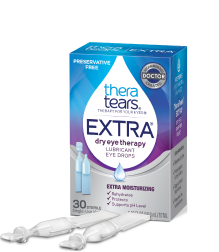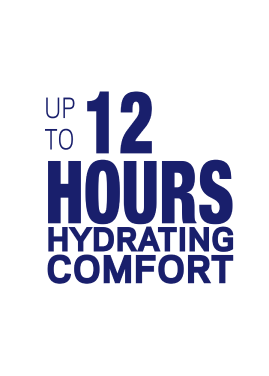Science-Backed Hydration™

Hygiene for Healthy Eyes: Essential Nighttime Dos & Don’ts
Good hygiene isn’t just about having rituals to stay clean, look good and smell great. It’s about taking care of every part of you, including your eyes, so that you can be at your best. Unfortunately, it’s pretty easy for eyes to become dry, red or irritated, but you do have some control over whether this happens and how quickly you get relief.
If your eyes feel dry and irritated before you go to bed or you wake up with red, gritty-feeling, dry eyes in the morning, it’s time to become more intentional about caring for your eyes to help preserve the tear film that keeps your eyes functioning and feeling well. In fact, even if you don’t have dry eyes at night, it’s still important to have a nighttime eye care routine because as you age, your risk factors for getting dry eyes increase.
10 Healthy Eye Habits to Help Prevent or Relieve Dry Eyes at Night
Between airborne irritants and digital screens being a near-constant presence, today’s world can make it hard to avoid having dry eyes. We’re making it easier for you by breaking down important tips in a simple “do” or “don’t” list.
Do…
- Wash your hands – Anytime you need to touch near your eyes or put in or remove contact lenses. Common eye infections like pink eye (conjunctivitis) can often be avoided simply by washing your hands frequently and not touching your face or eyes if you don’t absolutely need to.
- Remove eye makeup – Pretty much everyone who wears makeup has forgotten to remove it all before going to sleep at least once—things happen. But, in general, it’s best to remove makeup each night, especially from your eyes, to avoid eye irritation and redness. Be sure to use a soft touch and use makeup removers that are labeled as gentle cleansers too. If you’re using makeup removing wipes, remember to gently swipe instead of rub. You’ll save some lashes with this tip too!
- Massage your eyelids – Gently massage your eyelids for a few minutes before bed and when you wake up. This can stimulate tear production to help keep your eyes from feeling dry.
- Use nighttime eye drops – “Nighttime” eye drops are specially formulated to help keep your eyes lubricated through the night, helping to prevent dry eyes and give you nighttime dry eye relief.TheraTears® Liquid Gel Nighttime Dry Eye Therapy has a liquid-gel formula to provide soothing, longer lasting relief. Single-use vials ensure they’re as fresh as natural tears. (For help choosing a night eye lubricant that works best for you, check out our article, “Optimal Relief: The Best Nighttime Eye Drops for Dry Eyes.”
- Consider using an air purifier at home – If you live in a major city or an area with high levels of pollution, you may want to add a high-efficiency particulate air (HEPA) purifier that can remove 99.97% to 99.99% of airborne particles that are equal to, smaller or larger than 0.3 microns in size. These tiny particles seep into your home and you don’t even realize it, but they can contribute to dry eyes. In fact, a study of U.S. military veterans found that the risk of dry eye when living in or around a major city can be 3 to 5 times higher than in areas with much less air pollution.1
Don’t…
- Forget to blink – Blinking is the natural way our tears consistently lubricate our eyes. When we’re focusing on something continually (a phone, laptop screen, or book), it’s easy to stop blinking. Eyes need a break, so no matter what you are doing, be sure to look away from what’s in front of you (unless driving, of course). You can follow the 20/20/20 rule—take a 20 second break every 20 minutes to look at a different point 20 feet away—or you can simply time your own breaks according to what works best for you and your eyes. Also, try and be more conscious of when you are not blinking and blink intentionally.
- Scrub or rub your eyes – Whether you have an itch, a fallen eyelash, are tired or are cleansing your face, “gentle” is the word to remember. Use a light touch on your eyes and on the delicate skin of your face.
- Smoke – Smoking not only can cause dry eyes, it has also been shown to increase your risk for certain eye conditions such as cataracts and macular degeneration. Being around other people who smoke can also irritate and dry your eyes.
- Use a hair dryer if you shower before bed – The hot air that blows across your face can cause dry eyes and make existing dry eye symptoms worse. In fact, you don’t want a fan blowing air across your face while you sleep either for the same reason.
- Leave sheets on your bed for weeks – Bedding should be changed and washed at least once a week. Even if you shower before bed, your sheets collect dust, pollen, and other potentially irritating particles from the air in addition to skin flakes and pet dander, which can all cause eye irritation and lead to dry eyes when you wake.
Beyond Nighttime Dry Eye Relief
The ultimate in healthy hygiene for eyes is to see your eye doctor each year for a vision check and prescription update. Using glasses or contact lenses with an outdated prescription can cause eye strain and dry eyes too. Also, do not wear your contacts longer than directed. Even if you have extended wear contacts, do not wear them at night if you have dry eyes at night or frequent eye redness or irritation.
Artifical tears, such as TheraTears® Dry Eye Therapy lubricant eye drops, can relieve and soothe burning, irritated eyes during the day, but if you have these eye issues often, talk to your doctor.
1 Source: https://www.aao.org/eye-health/tips-prevention/dry-eye-tips
EXTRAordinary relief, now available in preservative free vials
TheraTears EXTRA dry eye therapy

EXTRAordinary relief, now available in preservative free vials

